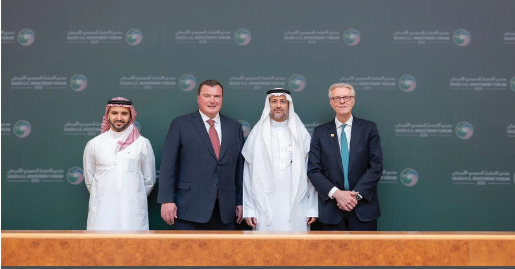Publisher: Maaal International Media Company
License: 465734
Among public, private sectors
Al-Ajlan Call for Enhancing Joint Action to Revamp Kingdom’s Exports
Chairman of the Federation of Saudi Chambers of Commerce Ajlan Al-Ajlan called for joint action between the public and private sectors to enhance the access of the Kingdom’s exports to international markets, improve the export environment and spread its culture within the Saudi business community, in order to achieve the aspirations of the Kingdom’s Vision 2030.
Raising the proportion of non-oil exports to about 50% of the total domestic product, shall be the goal, he added, praising what the Saudi industry and the private sector, in general, find in the interest, care and support of the Custodian of the Two Holy Mosques King Salman bin Abdulaziz Al Saud and HRH Crown Prince.
This came during participation as a speaker, in the opening session of the 9th Annual Saudi Trade Finance Summit, in Riyadh, along with senior financial decision makers, relevant bodies, companies and business owners.
اقرأ المزيد
To improve the Kingdom’s export system, Al-Ajlan pointed to the necessity of unifying the regulatory reference for the export sector, signing more free trade agreements with countries, enabling small and medium enterprises to enter the export market, improving the capabilities of commercial attachés, in the targeted countries and holding trade fairs.
He stressed that Saudi exports are in the stage of recovery after the pandemic, as Saudi exports of non-oil products increased, in the second quarter of 2021 by 55% compared to the second quarter of the year 2020.
International buyers and the concentration of demand on basic products, such as food and medicines, which do not constitute a large percentage of the total Saudi exports, due to the nature of the Saudi industrial sector, in addition to the low percentage of re-exports, as the priority to secure domestic demand.
Al-Ajlan noted the leading role played by the Federation of Saudi Chambers, in the file of “Saudi exports” in general and during the pandemic, specifically, through the National Committee for Exports, which includes a group of Saudi exporters, who are working to discuss export issues and overcome obstacles with government agencies, inside and outside the Kingdom.
The federation formed a crisis cell, during the pandemic that worked to facilitate communications between the government and the private sector to reduce negative impacts on commercial activities and communicate with international partners, to ensure the continuity of supply and supply chains.
And it also works on a regular basis to conduct studies to understand the challenges facing exports and discuss them with the relevant authorities, in order to remove them or find appropriate solutions for them.
He stressed the importance of the partnership between the public and private sectors to improve Saudi trade in international markets, noting the federation’s role in empowering the Saudi private sector, through more than 125 local and international alliances and partnerships, that clearly contributed to the growth of the private sector and the opening of new markets for Saudi exports.
Al-Ajlan pointed to the importance of the initiative to localize industry, in promoting exports, as the Kingdom is now producing many materials that it used to import from abroad, such as military equipment and others.
After securing local demand, it is expected that it will focus on expanding in foreign markets, and this is one of the goals of the Kingdom’s Vision 2030, to increase localized existing industries and creation of new industries, through many programs that have shown good results, that will positively reflect on the GDP and Saudi exports







